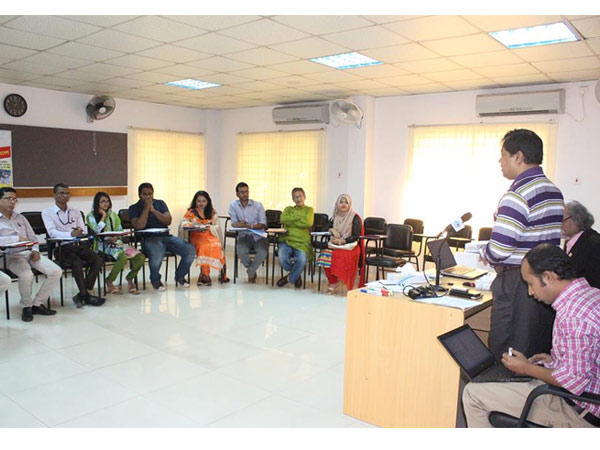A day-long strategic workshop titled- ‘Community Radio for the Future: Multi-Platform Presence, Multi-Generation Reach, Editorial Independence & Serving the Public Interest’, was held on 13 November, 2016 at the Meeting Room of Community Radio Sarabela, located in the premises of SKS Inn at Gaibandha.
The Program was organized by Bangladesh NGOs Network for Radio and Communication (BNNRC) in collaboration with Community Rado Sarabela, SKS Foundation under the support of Free Press Unlimited.
A total of 14 Community Radio Broadcasters and representatives of the initiator organizations of 6 Community Radio Stations (all located in northern region of the country namely Community Radio Mahananda, Community Radio Borendra, Community Radio Padma, Community Radio Mukti, Community Radio Chilmari and Community Radio Sarabela) participated in this event.
On behalf of BNNRC, Mr. AHM Bazlur Rahman, the Chief Executive Officer, Syed Kamrul Hasan, Coordinator-KM4D of BNNRC and Ms. Tamanna Rahman, Coordinator – Capacity Building and Mr. Rajab Ali, Head of SKS Foundation attended the workshop.
The objectives of the workshop were to exchange and share common radio contents among all 6 Community Radio Stations and to produce more creative and quality radio programs in a common platform for their respective audiences to enjoy and benefit from various diversified contents based on their local demands.
Speaking about the importance to exchange radio programs, AHM Bazlur Rahman highlighted on 4 issues such as multi-platform presence, multi-generation reach, editorial independence and serving the public interest’. He said, “If the six CR Stations could be able to exchange and share joint radio programs, they would reach altogether 29 lacs audiences at a time! As a result, by using this common avenue, in future, the broadcasters will ensure to mobilize their target communities, i.e. they will be able to create a multi-platform where they can ensure multi-generation presence or reach.”
Regarding the role and possible threats Syed Kamrul Hasan briefed four stages of community media, such as community media for serving a community, act an alternate to mainstream media, linking to the local civil society and how the community media would act as rhizome for the rural community.
The participants presented their action plans by dividing them into two groups, such as one was technical and other on programmatic aspects. They highlighted about their possible future common and combined contents and formats. Selecting 25 local need based issues, the assigned CR Broadcasters would make two types of program formats, one as a weekly based 30 minutes duration magazine format and another on development news-reporting. They have decided that each CRS would make a single component of a magazine program bi-rotation which would lead to coordinate to broadcast their combined program for 2 months. It was also decided that the broadcasters would avoid any information related to party politics.
Technical group in their presentation, requesting the program persons, for the sake of smooth on airing, all prepared radio formats must be on their hand before two days of scheduled broadcasting the program. A separate server will be purchased and each CRS will use this server for two months on rotation. From live broadcast, they would upload and download all programs, as appropriate to the technology in place. All these programs would be available in the social media, such as You-tube, Facebook etc. , it was decided that they would initiate to on air the programs two days before the scheduled broadcast programs.
In presentation, they also committed to tackle all possible challenges; they have also proposed some way-outs to address those challenges in an affordable way. Such a common platform would also have potentials to work together as pressure group by using social media, appropriate apps and application of internet broadcasting.
It was decided that this draft action plan will be finalized in another brief workshop in Dhaka and after approval of their senior management.
The workshop was ended with a brief feedback session of the participants and vote of thanks by Mr. Rajab Ali, Head of SKS Foundation
